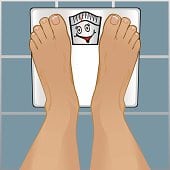by: Emily John 
You may realize that your body has started to change when you reached middle age. Your clothes start getting smaller as the numbers on the scale went up. Losing weight over 50 may be quite challenging because there is a huge change in your hormones. Losing and maintaining a healthy weight requires eating a balanced diet and actively engaging in physical activities. This is a very important part of staying healthy & independent as your age.
Consider these 5 things when trying to lose weight at 50 years and beyond:
1. Eat Enough Proteins, Vegetables, and Whole Foods
Eating a diet high in protein helps you feel full longer. A high-protein diet helps you burn more calories, and it can help repair damaged tissues and muscle cells. Whole foods help your body minimize the amount of sugar in the blood. In order to lose weight more effectively, be sure to do away with high sugar foods such as many breakfast cereals, canned fruits, and fruit juices. Instead, stock your home pantry with more high-protein, fiber-rich foods. If eating in a retirement community, make healthier choices from the menu, like grilled & roasted meat, steamed & raw vegetables & salad, and take it easy on the dessert. Just because it’s included, doesn’t mean you should eat it.
2. Do Not Skip Your Meals
Not eating enough or skipping a meal may make you feel hungry or weak, and it causes your brain not to function properly. You will lack the essential nutrients required to nourish your body as you grow older. Contrary to the common opinion, eating a balanced diet will increase your body’s metabolism; a slower metabolism will make you eat more, thus adding more weight. If you are unable to independently prepare balanced meals, try contacting an in-home meal preparation service, or hire home care to help you shop & prepare your meals.
3. Get Enough Sleep
Sleep is an important factor when trying to lose weight. A balanced diet, coupled with regular exercise, may not be sufficient enough to help you lose weight if you do not get enough sleep. Poor sleeping habits stimulate the hormones that control hunger and appetite. The leptin hormone suppresses your appetite thus causing your body to spend energy. On the other hand, the ghrelin hormone triggers the hunger when you deprive yourself to sleep. Sleep deprivation makes you eat more calories at night which leads to weight gain.
4. Exercise
Consider doing more strength training exercises – also known as resistance training. Strength training exercises help build and maintain muscle, they help you lose weight, and they can lower blood sugar levels. Additionally, strength training exercises are good for joints and bone strength which improves mobility. Also, consider aerobic exercises. Cardiovascular exercises are known to improve your heart’s health. Most senior communities have a gym and many offer a trainer to help you get started and stay safe. If exercising in your home, remember to play it safe to reduce risks of injury. Most importantly, consult with your doctor before you undertake any training.
5. Reduce Eating Out
Independent individuals, age 50 and beyond, tend to eat out more. Dining out increases the likelihood of consuming the processed, fatty foods that result in weight gain. One way to combat potential weight gain would be to prepare balanced meals in your home. If you plan to eat out for dinner, make sure and eat 2 small healthy meals at home before so you don’t overeat while out. And remember to make healthy choices when you are out.
As you age, your body needs proper care. Eating well and exercising regularly will keep you happy, and your body healthy and fit, which will increase your independence. Ultimately, you may come to realize that losing weight, after 50, is worth the work.